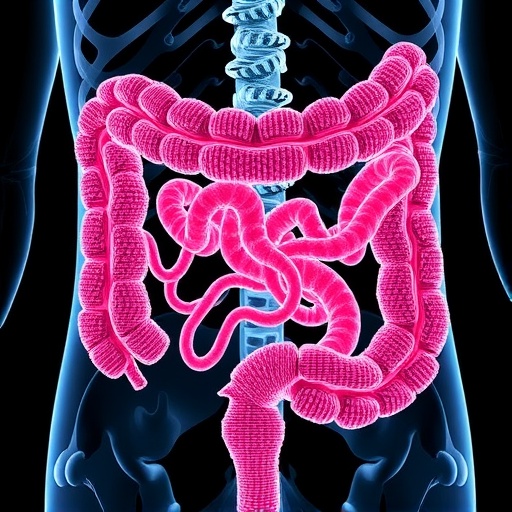In a groundbreaking study published in BMC Cancer, researchers have unveiled a novel gene model linked to angiogenesis that significantly advances the prediction of prognosis in colorectal cancer (CRC). This pioneering work sheds new light on the intricate molecular mechanisms underpinning CRC development and opens the door to personalized therapeutic strategies, marking a potential paradigm shift in cancer management.
Angiogenesis, the formation of new blood vessels from existing vasculature, is a fundamental biological process that tumors exploit to sustain their growth and metastasis. In colorectal cancer, the dysregulation of angiogenesis-associated genes has been recognized as a key factor influencing tumor aggressiveness and patient outcomes. However, a comprehensive model integrating these gene expressions for prognosis prediction in CRC had remained elusive until now.
The research team embarked on a rigorous exploration of angiogenesis-associated gene expression profiles using a diverse array of publicly available genomic databases. By harnessing cutting-edge bioinformatics tools and high-throughput data analysis, they identified distinct molecular subtypes within colorectal cancer, each characterized by unique gene expression signatures related to angiogenesis pathways. This stratification underscores the heterogeneity of CRC and suggests tailored approaches for patient management.
Central to their approach was the development of a predictive model incorporating the least absolute shrinkage and selection operator (LASSO) alongside multifactorial Cox regression analysis. This sophisticated statistical framework enabled the researchers to pinpoint a robust set of prognostic genes capable of accurately forecasting patient survival outcomes. The model’s predictive performance was rigorously validated across multiple cohorts, demonstrating remarkable reliability and consistency.
One of the study’s striking revelations was the model’s ability to reflect tumor microsatellite instability status—a critical biomarker influencing treatment decisions and prognostication in CRC. Furthermore, the gene signature correlated strongly with immune cell infiltration patterns within the tumor microenvironment, highlighting the interplay between angiogenesis and immune evasion mechanisms in colorectal cancer progression. Such insights are invaluable for refining immunotherapeutic strategies.
In addition to immune dynamics, the model demonstrated a significant association with tumor mutation burden (TMB), a metric gaining traction as a predictor of response to emerging cancer therapies such as immune checkpoint inhibitors. This multidimensional correlation bolsters the model’s utility in clinical contexts, where comprehensive tumor profiling can guide more informed and precise treatment plans.
The prognostic model also extends its clinical relevance to pharmacogenomics, as it was found to correlate with differential drug sensitivity. This aspect positions the gene signature as a potential tool for personalizing chemotherapy regimens, ensuring patients receive agents to which their tumors are most likely to respond, thereby maximizing therapeutic efficacy while minimizing unnecessary toxicity.
Importantly, the study transcended computational predictions by validating the expression patterns of select prognosis-related genes in clinical CRC tissue samples. This translational step not only confirms the biological plausibility of their findings but also underlines the practical applicability of the gene model in real-world clinical settings.
The identification of angiogenesis-associated molecular subtypes within colorectal cancer represents a formidable advance in understanding tumor biology and heterogeneity. By delineating these subgroups, the study provides a nuanced perspective that could refine current classifications and foster the development of subtype-specific interventions, ultimately enhancing patient stratification and outcomes.
Moreover, this research heralds a new era in prognostic modeling by integrating complex biological data into actionable clinical insights. The model’s comprehensive framework, incorporating angiogenesis, immune contexture, mutation burden, and drug response, exemplifies the potential of systems biology approaches in cancer prognosis and therapy personalization.
As colorectal cancer remains a leading cause of cancer morbidity and mortality worldwide, innovations such as this gene model are urgently needed to improve detection, treatment, and survival rates. By empowering clinicians with sophisticated prognostic tools, patients stand to benefit from more accurate risk assessments and tailored therapeutic regimens that reflect the molecular intricacies of their tumors.
This study’s implications extend beyond colorectal cancer, as the methodological blueprint and insights into angiogenesis could inform similar models in other malignancies where vascular biology plays a pivotal role. Consequently, it paves the way for broader applications of gene signature-based prognostic and therapeutic strategies across oncology.
Future research will likely focus on refining the model through integration with additional omics data, such as proteomics and metabolomics, to capture an even more detailed tumor profile. Moreover, prospective clinical trials will be essential to validate the model’s efficacy in guiding treatment decisions and improving patient outcomes in diverse populations.
In conclusion, the development of this angiogenesis-associated gene model represents a monumental stride in colorectal cancer research. By offering a reliable and multifaceted prognostic tool, it promises to transform the clinical landscape, fostering personalized medicine approaches that align with the molecular complexity of cancer.
This landmark study underscores the power of integrating molecular biology with advanced computational methodologies to unlock new dimensions in cancer prognosis and treatment. As science continues to unravel the genetic undercurrents of malignancies, models like this serve as beacons guiding the journey toward precision oncology.
Subject of Research: Colorectal cancer prognosis prediction based on angiogenesis-associated gene expression profiles.
Article Title: Development of a novel angiogenesis-associated gene model for prognosis prediction in colorectal cancer.
Article References: Shen, Y., Bao, T., Yuan, T. et al. Development of a novel angiogenesis-associated gene model for prognosis prediction in colorectal cancer. BMC Cancer 25, 1628 (2025). https://doi.org/10.1186/s12885-025-15088-7
Image Credits: Scienmag.com
DOI: https://doi.org/10.1186/s12885-025-15088-7




